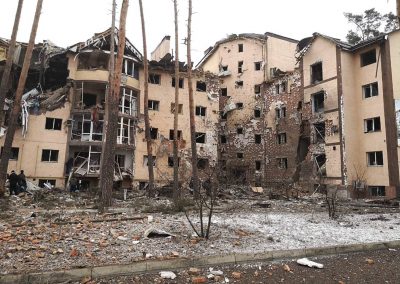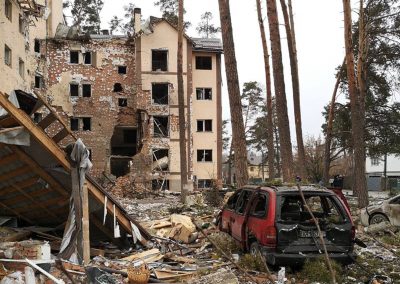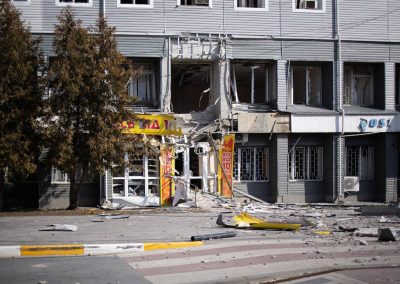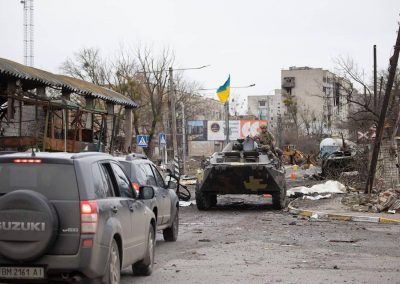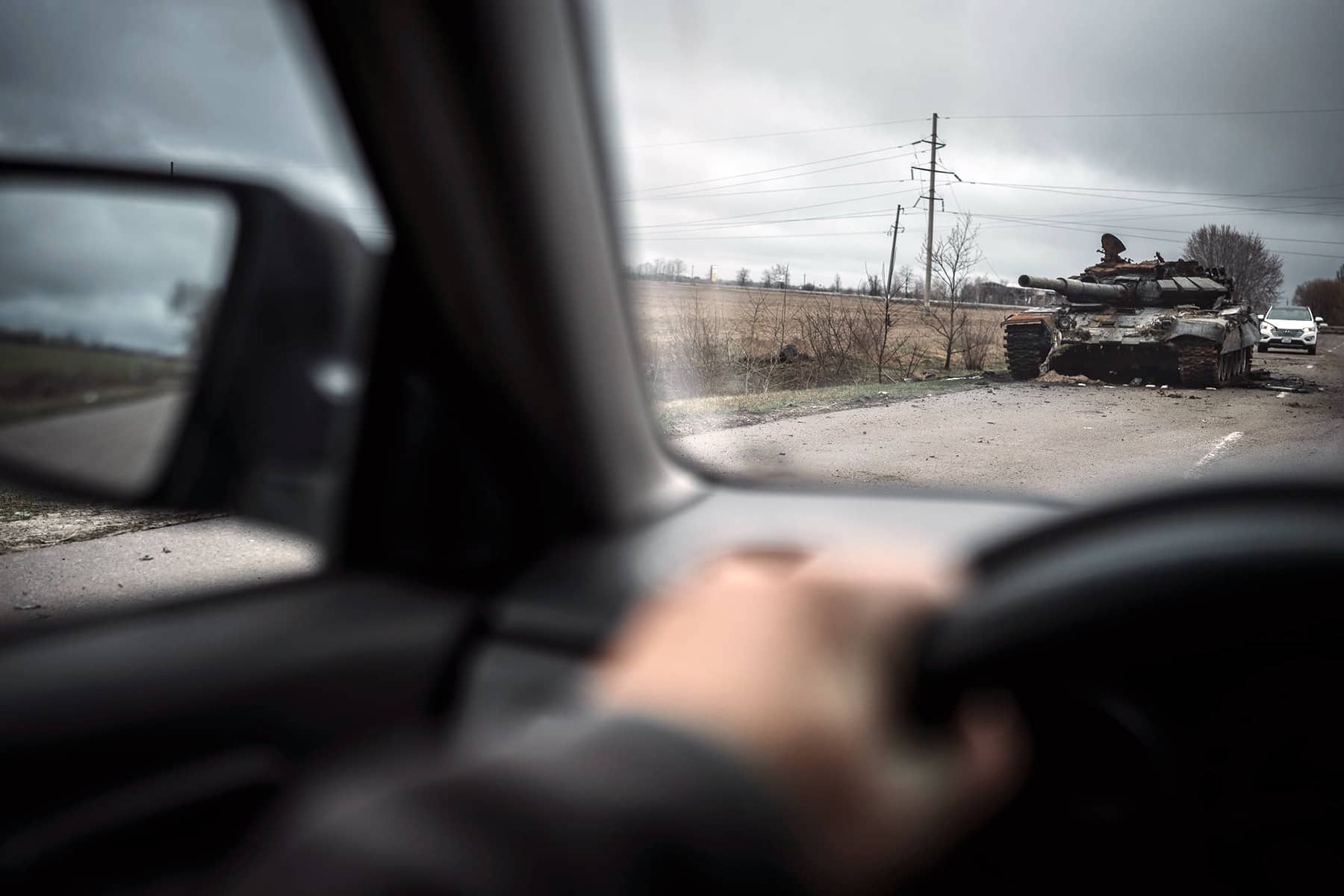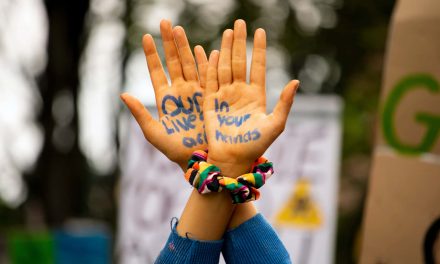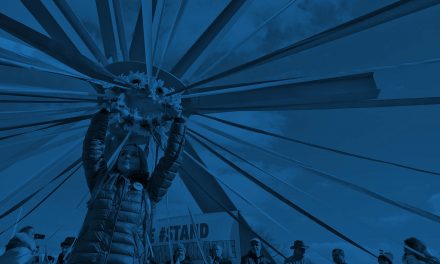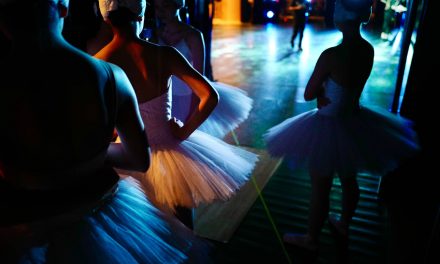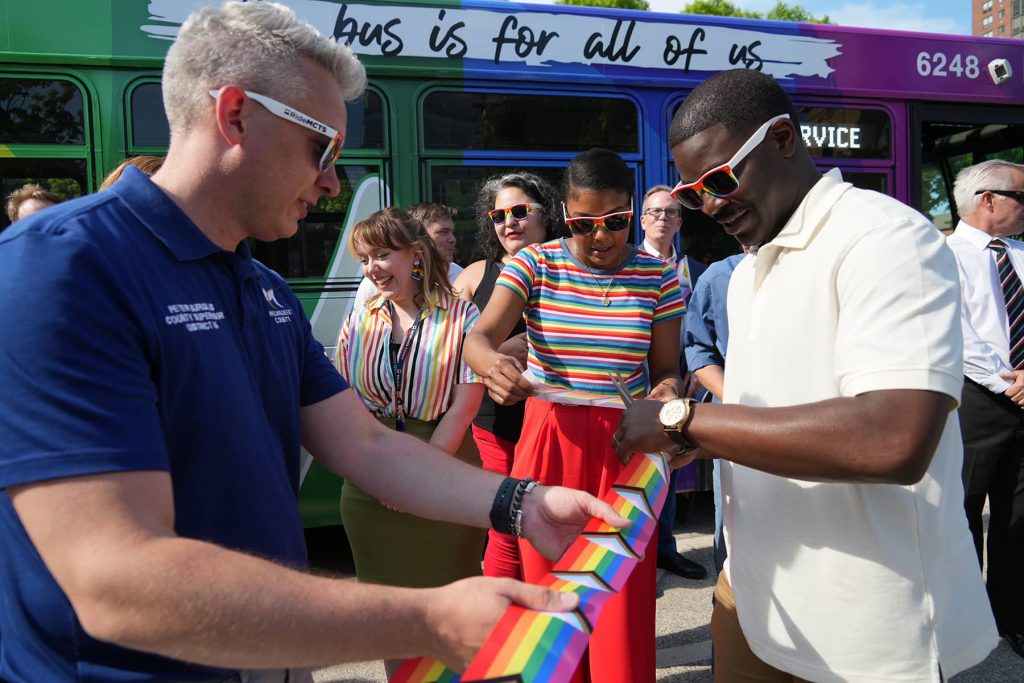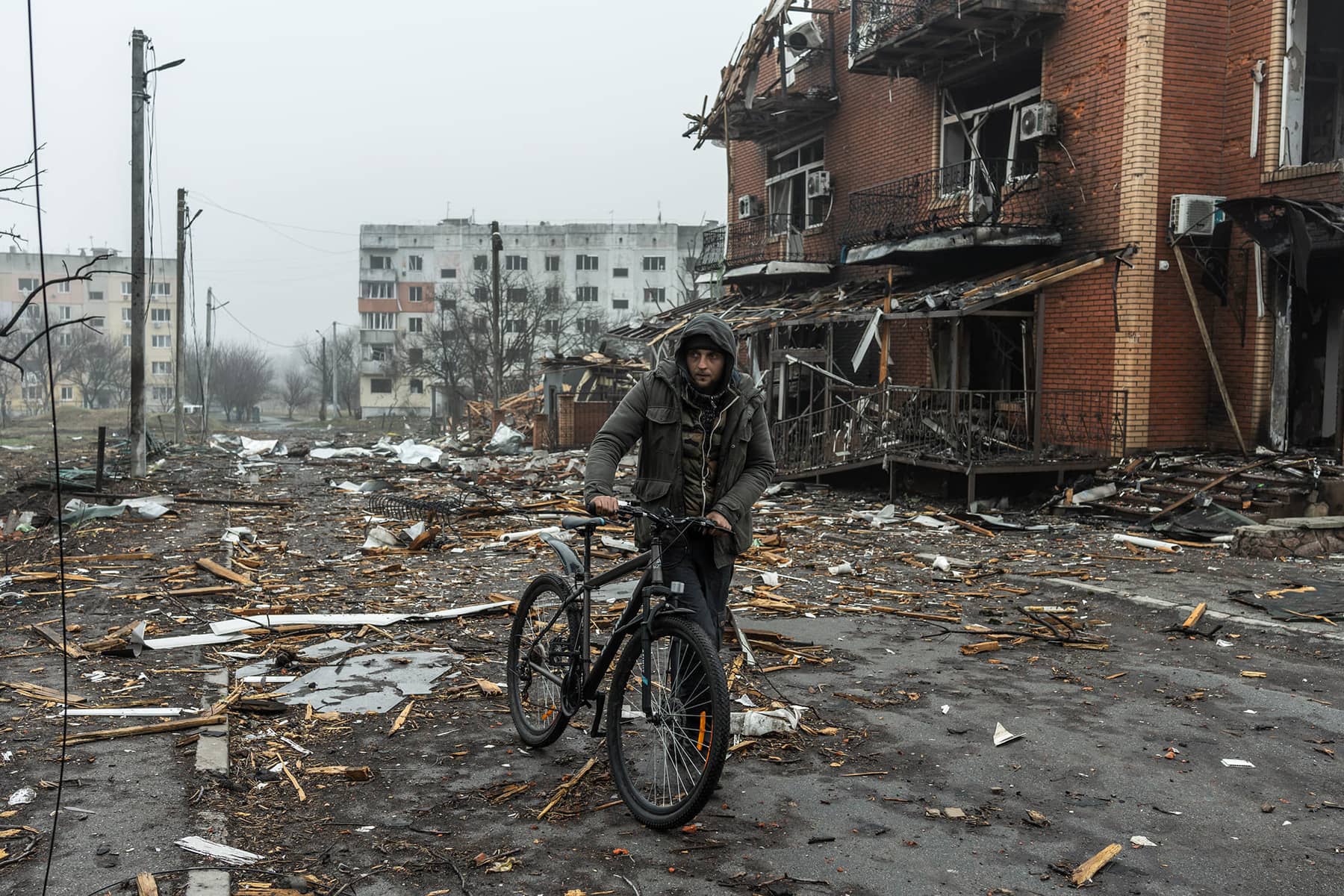
Irpin, a commuter town on the northwest edge of Kyiv, was once famous for its peace and quiet in comparison with the buzz of the Ukrainian capital. But since Russia’s invasion of Ukraine in February, the town has become synonymous with shelling and indiscriminate violence.
As Russian troops made a brutal attempt to take Kyiv, they were stopped on the outskirts of the capital. Places like Irpin, Bucha and Hostomel were quickly transformed into a battleground, where civilians were caught in Russian shelling, air raids and direct violence by Russian troops. Many who chose to evacuate had to do so at extreme risk to their own lives, and the lives of the volunteers helping them. For those who stayed, the risk was unimaginable. As Ukrainian forces have retaken Irpin, Bucha and surrounding areas, they have found evidence suggesting Russian forces indiscriminately murdered Ukrainian civilians. On March 28, Irpin was declared completely liberated from Russian troops by the town’s mayor, Olexander Markushyn, who said between 200 and 300 residents had been killed. This is the harrowing experience of the Vitaliy Kirichevskiy, a Ukrainian journalist who lived in Irpin, Milwaukee’s sister city. Everything described was real, though names have been changed to protect the individuals involved.
Seventh day of the war
It’s March 2, the seventh day of the war. It’s early morning in Irpin. I wake up around 7:00am, having spent the night shuddering from the sounds of shooting outside my window. I’m making my favorite coffee, and Russian bombers are already flying outside the window: I can see and hear them from my balcony.
At 7:38am, a special program on my phone informs me that an air raid alert has been declared in the Kyiv region. My coffee and hot sandwich are ready. I really don’t want to go down five floors to the basement, which is being used as a shelter. I don’t want to hide from the enemy in the air, whom I didn’t invite into my house.
I decide to take cover in the bathroom. After all, no one scrapped the ‘two-wall rule’ – put two internal walls between you and the outside world during shelling or an air raid. I put my cup of fragrant coffee and plate on the edge of the bathtub. The terrible roar of the plane becomes louder, it is already buzzing in my ears, a huge aircraft engine is approaching. I lie down on the tiled floor, cover my head with my hands, and then hear a powerful roar and rattle. The walls shake, part of the ceiling falls on me, the light goes out, and I’m left lying on the floor covered in fragments of brick and drywall. The Russians have dropped an aerial bomb on my house, where hundreds of civilians live.
I climb out of the pile of rubble, which is covered in my half-drunk coffee. It seems I am not injured, and am able to stand on my feet. I look at myself: safe and sound – I can hardly believe it myself. The walls and drywall in my bathroom are cracked; in the kitchen and the hall, windows and balcony doors have been thrown open by the blast wave, and the ceilings in all the rooms are at least partly collapsed. The windows, surprisingly, are intact.
There are fumes and dust particles in the air, it’s hard to breathe. Once again I catch myself thinking that I don’t understand how miraculously I was able to survive. My hands, legs are trembling. I put my coat on and go down to the yard outside my apartment block.
On my way down, I come across a lot of blood on the steps and the wall on the second floor. On the first floor I find a severed human hand.
“Ambulance, we need an ambulance! There are wounded, it’s awful,” my neighbors scream. Someone is lying bloodied and moaning, someone is bandaging the wounded with bandages. Everyone is in a panic.
‘What a catastrophe,’ I think, when I see my ‘new’ yard, created when the ‘Russian world’ made its violent arrival in Irpin.
The bomb hit the first floor of the apartment block, damaging the foundation of the entire five-story building. It demolished two of the upper floors, but the last floor, where my apartment was, miraculously survived.
There is a hospital near my house. I run there to call for medical assistance to the wounded neighbors.
“Guys, we had an explosion, a bomb hit us. Help, please, there are a lot of wounded!” I shout to the hospital security guards.
“We know. They are already on their way,” two frightened security guards answer.
I return to my dilapidated house, hands still trembling, and light a cigarette. A neighbor from the second floor is walking toward me: his right arm has been torn off and half of his face has been disfigured by fragments of broken glass. The half-smoked cigarette drops from my mouth.
Living in a bathhouse
An hour has passed since the airstrike that changed my life forever. I am standing in the rubble of my dilapidated apartment building. The building I lived in for ten years. The apartment, where I laid laminate flooring and tiles with my own hands, no longer exists. Now I have nowhere to live, nowhere even to sleep tonight. I decide to call my friend Katya, who lives not far from me.
“Hi Katya.”
“Hello Vitalik.”
“Today, Russian fascists dropped a bomb on my house, my apartment doesn’t exist any more. I survived, miraculously.”
“Oh-oh-oh-oh-oh. My God! Are you OK, not injured?”
“Not a single scratch! I don’t know how I survived, it’s just some kind of miracle!”
“Thank God you’re alive!”
“Yes, I think so too. Listen, Katyusha, I don’t even know where to go, my apartment is gone…”
“Go to my house. I was evacuated from Irpin, we’re now in a village near Vinnytsia with the children. My father stayed in Irpin, go to Uncle Pasha, he will take you in. I will call him now. But you’ll have to live in our bathhouse.”
“I’m on my way. Thank you very much, Katya.”
Most of my neighbors, or rather former neighbors, have already left: some went with volunteers to a bomb shelter or to stay with relatives, others remained in the bombed-out building. I have no choice but to go to Katya’s house. I don’t really want to stand on the street under the roar of Russian rockets and mortars.
My Irpin is no more
“Hi Uncle Pash! Are you taking people in?” I ask Uncle Pasha when I get to his house.
“Vitalik, how are you? What happened, tell me?
“What can I tell you: that’s it, my house is no more.”
We go to the bathhouse. Once, groups of noisy people came here to relax. Now it’s empty and cold.
“I’ll chop some wood and get the bathhouse going, you’ll get warm,” Uncle Pasha reassures me.
“Can we have a drink? I have a bottle with me.”
“That’s not allowed! When you’re drunk, you lose your vigilance. We have a wooden ceiling here. If a projectile flies from above, that’s above! It is better to hide in the toilet or the changing room. There’s a concrete ceiling.”
We drink some hot tea. In the evening, the shooting only gets louder. The gunfire comes from all sides. We can no longer distinguish between rockets, mortars or machine guns. Everything has merged into a continuous sound. A terrifying cacophony. My heart is pounding, my hands are trembling and the walls are vibrating. Another shell explodes not far from the bathhouse, the walls and glass shake from the impact, my unfinished cup of tea falls to the floor. I have no luck with either morning coffee or evening tea, it seems.
Far past midnight. Uncle Pasha goes to sleep on the second floor. The bathhouse warms up. I lay a camping mat on the bottom shelf and put my towel under my head. I cannot sleep: I am either too cold or hot. I open the door to the steam room, but the sounds of shooting are even louder.
I manage to switch off for a moment and sleep for about 20 minutes. During this short sleep, pictures of Irpin pop up in my memory: the town’s Pokrovsky and Neznaiko parks, the beach near the lake, the saleswoman Aunt Valya from the shop next to our building, squirrels running on the city’s pines. The city was growing, developing. Thousands of Ukrainians moved here, just outside of the capital, in search of peace and quiet. Young people with children moved here. I liked to play tennis on the court near my house. In the summer, after playing a two-set match, I would go to the beach and swim there, and then, if I had the strength, I would play volleyball… My Irpin is no more. Now Irpin is a city of death, tears, and grief.
The shooting doesn’t stop. I take out a bottle of vodka from my backpack and drink straight from the bottle. The bitterness of the alcohol doesn’t register, it goes down like a glass of water. For the first time in my life, I drink vodka without drinking or eating. I fall asleep. In a dream, I hear the sound of an airplane flying and a bomb tearing my house apart. I wake up again. I take another swig from the bottle.
It’s stuffy and hot in the bathhouse. Through the door to the steam room, I see the first rays of the sun. I rub my eyes in sweat, I feel dried out in here. I take a few sips of water from the kettle. One of the previous guests left a pack of cigarettes on the table. I take one out and go outside. In the yard, tree branches splintered by shells are lying around. I see blood on the ground. Uncle Pasha’s sheepdog has been torn into three pieces.
Like clockwork
Every day, at about 8:00am, a Russian bomber appears in the sky over the Kyiv region and drops its bombs on residential buildings. Today, March 3, is no exception.
“Are you scared?” asks Uncle Pasha, who looks like he has barely slept.
“Yes. They just kill us here indiscriminately.”
“Do you want me to show you the bomb shelter? It’s next to our house. Just a basement of a five-story building, but they say it is more or less safe there.”
“Go on.”
We go to the basement, which turns out to be quite large. On the floor are old mattresses, some rags, some clothes. About 25 people are inside.
“Who are you?” asks a stocky man with a mustachio.
“This is my neighbour, his house was destroyed. He’ll stay here a little while,” Pasha tells him.
“Pash, do you vouch for him? Are you sure he’s not a separatist?”
“No, it’s okay. Don’t worry.”
I go into one of the three rooms in the basement. There are 12 people in it. People are eating sandwiches, drinking tea, moving their things around. Everyone is tired and tense.
“What’s your name? I’m Yura,” a guy, 25 years old, approaches me.
“I’m Vitalik.”
“Nice to meet you.”
“Where are you from?”
“My house is round the corner… It used to be, at least. Russian bastards destroyed it yesterday.”
“I’m sorry. Everyone here has their own grief. Have you thought about evacuating? It’s only going to get worse in Irpin.”
“I don’t know, I haven’t thought about it yet, I haven’t yet recovered from my shock.”
“Have a think. Tomorrow, they say, there will be an evacuation by train from our railway station to Kyiv. We want to go. You can join us if you like.”
“I’ll have a think. Thank you.”
“Make yourself comfortable. Look, there’s a free mattress. A young couple went on foot to Romanivka today, and from there volunteers promised to take them to Kyiv. Lie down in their place.
I open my backpack. I have a mug and some bread in there, nothing else. I settle down on a mattress between an elderly couple and Natasha, who is originally from Donetsk. In 2014, she left the city for Irpin, fleeing the war. In Irpin, a mortar shell hit her house: the walls were damaged, windows were broken, but the kitchen survived. She, like me, miraculously survived, as did her cat Tishka, who is now shyly hiding behind everyone’s bags in the corner of our new shelter .
The light is on all the time in the basement. There’s only one bulb near the door, but it’s very bright. I don’t have a blanket. I pull my jacket over my head to hide the light.
In the morning, Yura wakes me up. “Are you coming with us? Wake up. Are you coming?”
“Where?”
“I told you. We’re going on foot to the station, and from there they promise to evacuate us by train to Kyiv.”
“No, Yura. I’m not ready yet. It’s dangerous. Let’s do it another time.”
“As you wish. We’re going. The four of us.”
“Good luck to you.”
Two hours later, from the basement’s radio, we learn that the Russian forces bombed the railway line to disrupt the evacuation of civilians. Towards the evening, Yura’s wife calls. She says he was shot not far from Romanivka. The young couple who went with them were also killed. Yura’s wife was wounded in the leg. She was sent to the hospital.
Cold March
On March 5, the basement loses its electricity, heating and internet. It’s snowing outside, and very cold inside. We’re running out of food. All the inhabitants of the basement brought leftover food from their houses. Today, we have chicken offcuts, potatoes, carrots. We decide to cook soup for breakfast. At the entrance to the basement, people have organized a mini-kitchen: a cauldron on a fire. It’s about 6:00am, but the artillery fire does not stop. We want to have time to cook food on the street before 8:00am, because we already know that we will be bombed again by a Russian plane, and we will definitely have to hide in the basement.
“Did you hear today that civilians were shot this morning?” Natasha from Donetsk asks me.
“No, I didn’t hear that.”
“Seven people were killed. A whole family tried to evacuate, relatives too. Something like four kids and three adults. They killed everyone,” says Natasha, stirring soup in a cauldron with a spoon.
“That’s awful.”
“They were driving in a passenger car. I don’t even know how they all fit in there.”
Natasha is smoking. She smokes a lot. Tishka, who looks well-fed, is cleaning himself near us. He got some raw giblets.
“Damn, it’s starting again. Do you hear? It’s already flying,” Natasha says and looks at the sky.
We both distinctly hear the eerie rumble of an approaching aircraft. Natasha throws out her cigarette. We quickly run into the basement and lie face down on the floor. The aircraft flies right over us, soon a powerful explosion is heard. Another bomb was dropped not far from us on private residential buildings. As we later learned, ten people were feared to have died in that attack.
“I can’t take it anymore. We’re all finished here. I have no strength left,” Natasha cries.
“Yes, nothing good will happen here,” I say. “How many houses have been destroyed. Corpses are lying everywhere, they are no longer being removed from the streets.”
“I would have left long ago but I can’t leave my mother. She had a stroke not long ago. She’s 80 years old. The volunteers said that they cannot transport bedridden people now. They said ‘wait’.”
“Wait for what?”
“De-occupation. It seems, it will happen soon…”
March has turned out to be cruel and frosty. Everyday it gets colder in our Irpin basement. Some do not withstand frost and return to their apartments: they turn on gas stoves in the kitchen to warm up. One person walked about ten kilometres towards Romanivka to try to evacuate from there to Kyiv. We know nothing about their fate.
Farewell, Irpin
March 7. It’s my birthday. Over the past five days, I have said goodbye to life three times. I’m surprised I survived. Festive mood? None. Although the very fact I am alive makes me happy. Today, I spent the night in the bathhouse, despite the mortal danger. Uncle Pasha made a fire in the steam room and I was able to warm up. I drank coffee with Pasha but as soon as the Russian plane started flying overhead, as scheduled, I went to the basement.
Outside the basement, I meet Natasha. She is smoking, her eyes are tearful.
“What happened?”
“Mum died overnight.”
“My God.”
“No one will bury her in the cemetery. All the services in the city are not working, and even under shelling… you understand.”
“Sorry about your mum. What are you going to do?”
“I agreed with the hospital that we will bury her there. A neighbor will help dig a hole. And then we’ll see. When the war is over, we will rebury her.”
There’s a pause.
“Listen Vitalik, you need to get out of here. We’ll be killed here. Sooner or later. I would go myself, but today I can’t. Take a chance. Just please take my cat with you, I don’t have time for him now… I cooked some pasta with meat yesterday. I thought we’d have breakfast with mum today, but… Take the saucepan, it’s still warm. I left it on your mattress. That’s it, I’m off.”
In the basement, on my mattress, is a small pot of pasta and meat wrapped in a towel. Still warm. And nearby, the cat Tishka is meowing and trembling.
I decide to evacuate. In my backpack I have my documents, clothes and a pot of pasta, then my laptop and outerwear.
In Irpin, evacuation buses leave from outside the Pchelka store in the centre of town to the village of Romanivka, on the outskirts of Irpin. From there you can get to Kyiv. The road is very dangerous, you can be killed at any moment.
I say goodbye to everyone in the basement, run over to Uncle Pasha’s house to get my things and, together with Tishka, make my way towards the Pchelka store.
“Where are you going?” a guy in an old Zhiguli car shouts to me.
“Me? Who are you?”
“I’m a volunteer. I’m just getting people out of here.”
“Can you take me to Romanivka?”
“Well, of course. Get in quickly.”
I quickly put my bag in the back seat, and sit in the front with Tishka.
“I can’t sit at home when this is going on,” the driver says.
“How many people have you driven?”
“I did two runs today. Seven or eight people in total. A few more yesterday.”
For the first time in many days, I am outside the basement and the bathhouse. We drive past the streets and parks where I liked to walk. Instead, I see destroyed residential buildings, broken windows, torched cars with burnt corpses of women and children, a dead old man on a crumpled bicycle, a girl with her mother lying near the store… We get to Romanivka. I press Tishka to my chest and cry.
Vіtalіy Kіrіchevskіy
Vіtalіy Kіrіchevskіy and Sergi Mykhalchuk
Originally published as Five days that changed my life: Russia’s devastating attack on my hometown

